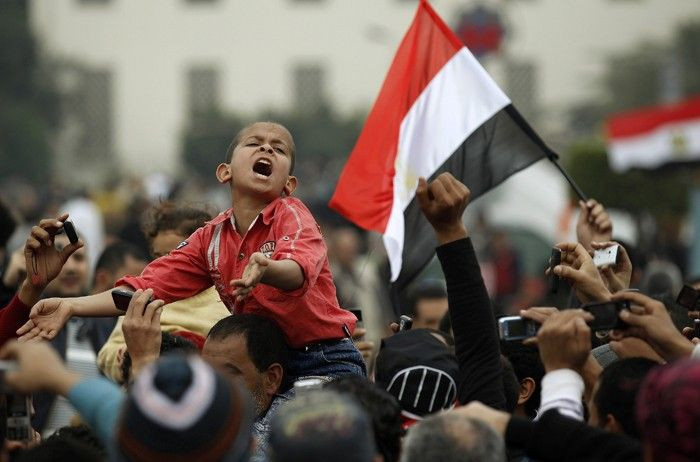Egypt counts cost of turmoil, protesters undaunted

Egyptians counted the economic cost of more than two weeks of turmoil on Wednesday as protesters on Cairo's Tahrir Square looked ahead to their next big push to oust President Hosni Mubarak later in the week.
A day after Egyptians staged one of their biggest protests in the capital, Tahrir Square remained crowded although no demonstration had been scheduled.
Karam Mohamed, from Beheira province in the Nile Delta, said the protests were growing. We are putting pressure on them little by little and in the end they will fall.
Protesters said the organisers were working on plans to move on to the state radio and television building on Friday, the day of the next big scheduled demonstration.
I think people outside will make crowds outside the radio and television ... President Mubarak will fall soon, in three or four days, said Mohamed Sadik, a Cairo engineer.
The television building, surrounded by armoured army vehicles, is on the Nile about one km (half a mile) north of Tahrir Square. Protestors said they might also try to spread towards the two houses of parliament which are also nearby.
BULWARK AGAINST MILITANT ISLAM
Three people were killed and several suffered gunshot wounds in clashes between security forces and some 3,000 protesters in a desert province far from Cairo on Tuesday and Wednesday.
With Mubarak refusing to step down before his term ends in September, the government has tried to portray itself as a bulwark against militant Islam and called for a return to normality for the sake of the economy.
In Berlin, German Foreign Minister Guido Westerwelle called on the Egyptian government to end emergency law and implement more political reform, echoing comments made by U.S. Vice President Joe Biden on Tuesday.
The Obama administration appears worried that Mubarak's government will not make meaningful changes in the most populous Arab nation, a strategic U.S. partner due to its peace treaty with Israel and control of the Suez Canal.
Vice President Omar Suleiman, who has been holding talks with opposition groups, has said there was now a road map to hand over power, but protesters have been unmoved by the plan.
A constitutional committee, appointed by Mubarak, has agreed on six articles that should be amended and said further articles could also be changed, the official news agency reported.
The articles including those governing presidential elections and terms of office.
But the Muslim Brotherhood, an 83-year-old, Islamist organisation seen as Egypt's largest opposition group, said real talks on handing over power had yet to begin. It said it was sticking to its demand that Mubarak step aside immediately.
Government attempts to defuse the public anger which erupted on January 25 have fallen flat and the economy is suffering. We cannot bear this situation for a long time and we must end this crisis as soon as possible, Suleiman said on Tuesday.
Analysts at Credit Agricole bank estimate the crisis is costing Egypt $310 million (192 million pounds) a day.
Ezzsteel, Egypt's largest steel maker, reported its plants were operating below full capacity but said an investigation involving its chairman, who had held a senior position in Mubarak's party, would not affect company activity.
Chairman Ahmed Ezz denied allegations about vote rigging in parliamentary elections last November. In Oslo, Statoil ASA
said it was no longer drilling in Egypt.
The Suez Canal, a vital source of foreign currency, reported a 1.6 percent drop in revenue in January from December. But revenue was up from a year earlier, and officials have said operations have been unaffected by the turmoil.
Likewise, a feared collapse in the Egyptian pound has failed to materialise although the authorities have acted in support.
The central bank said on Wednesday it was prepared to intervene directly in the currency market again after an intervention on Tuesday.
We will intervene when we see the market is not orderly. If it is not, we will use our tools, Deputy Governor Hisham Ramez told Reuters, saying the market so far was quiet and orderly.
The Egyptian pound slipped slightly in early trade after the central bank had stepped in to boost it by more than 1 percent on Tuesday when it hit a six-year low.
DEATH IN THE DESERT
The three people died when security forces clashed with a crowd of around 3,000 in New Valley, a province about 500 km (300 miles) from Cairo that includes a desert oasis.
It appeared to be the most serious such clash with official forces since January 28, when police all but disappeared from Egyptian streets after they had beaten, teargassed and fired on protesters. Last week, there was bloodshed in Cairo when Mubarak loyalists in plain clothes attacked protesters.
Al Qaeda's Iraq-based arm, the Islamic State of Iraq (ISI), attacked the Egyptian government for failing to implement strict Islamic law, and said it was better for Muslims to die fighting their government rather than live under its rule.
It called on Egyptian Muslims to free all prisoners from their nation's jails after Suleiman said on Tuesday that militants linked to al Qaeda were among the thousands who escaped from jails after January 28.
Don't rest until you have rescued them all, then destroy them (the prisons) with the aid of God, so that not a single stone remains standing, ISI said in a statement on websites.
The ISI's links to Egyptian militants and the strength of its influence are unclear, but some analysts said the group may have inspired a deadly attack on an Egyptian church last month.
The Muslim Brotherhood renounced violence as a means to achieve political change in Egypt decades ago and has warned that government efforts to stamp out its influence could push some towards more radical ideas.
© Copyright Thomson Reuters 2024. All rights reserved.





















